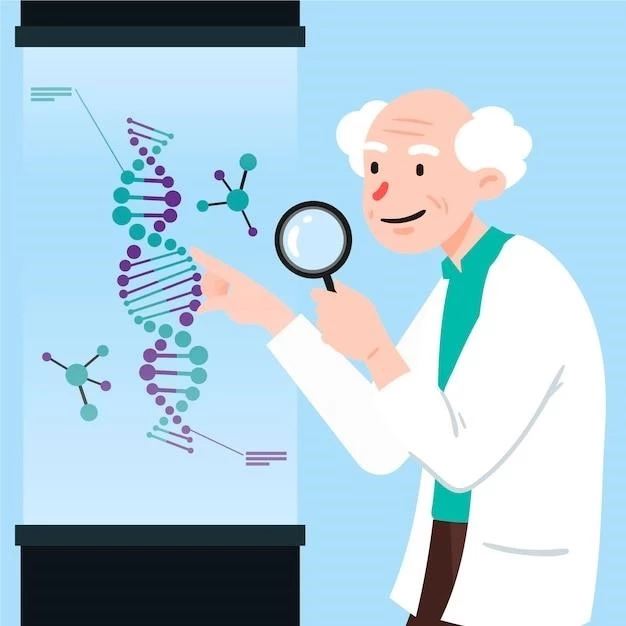Understanding Chromosome 6 Ring Disorder
Causes of Chromosome 6 Ring Disorder
Symptoms and Diagnosis of Chromosome 6 Ring
Treatment Options for Chromosome 6 Ring Syndrome
Genetic Counseling for Chromosome 6 Ring Patients
Research Advances in Chromosome 6 Ring Disorder
Living with Chromosome 6 Ring⁚ Challenges and Coping Strategies
Understanding the Prognosis of Chromosome 6 Ring Syndrome
Support Resources for Individuals Affected by Chromosome 6 Ring
Causes of Chromosome 6 Ring Disorder
Chromosome 6 Ring Disorder occurs when genetic material on the short arm of chromosome 6 forms a ring structure instead of the typical linear arrangement. This rare genetic condition can be caused by spontaneous errors during cell division or inherited from a parent who carries a balanced rearrangement of chromosome 6. Factors such as advanced parental age can also play a role in the occurrence of this disorder.
It is essential to consult with a genetic counselor or a healthcare provider for a comprehensive evaluation in case of any concerns about the risk factors or potential causes of Chromosome 6 Ring Disorder. Understanding the genetic basis of this syndrome can help in better management and planning for individuals affected by this condition.
Symptoms and Diagnosis of Chromosome 6 Ring
Individuals with Chromosome 6 Ring Disorder may exhibit a variety of symptoms٫ including developmental delays٫ intellectual disabilities٫ distinctive facial features٫ heart defects٫ and growth delays. Diagnosis of this disorder involves genetic testing٫ such as karyotyping or chromosomal microarray analysis٫ to identify the characteristic ring-shaped chromosome 6.
If you notice any concerning symptoms or suspect Chromosome 6 Ring Disorder, it is crucial to seek medical evaluation by a healthcare professional experienced in genetic conditions. Early diagnosis can help in implementing appropriate interventions and support services to optimize the quality of life for individuals affected by this rare genetic disorder.
Treatment Options for Chromosome 6 Ring Syndrome
Managing Chromosome 6 Ring Syndrome focuses on addressing individual symptoms and providing supportive care. Treatment plans are tailored based on the specific needs of each person and may include early intervention services٫ occupational therapy٫ speech therapy٫ and educational support to help with developmental delays.
Regular monitoring by a multidisciplinary healthcare team is vital to track growth, development, and any associated health issues. While there is no cure for Chromosome 6 Ring Disorder, supportive therapies and interventions can significantly improve the quality of life for individuals affected by this condition.
Genetic Counseling for Chromosome 6 Ring Patients
Genetic counseling is crucial for individuals with Chromosome 6 Ring Disorder and their families. A genetic counselor can provide detailed information about the genetic basis of the condition٫ inheritance patterns٫ and the likelihood of passing the disorder to future generations. Counseling sessions offer emotional support٫ guidance on family planning options٫ and help in making informed decisions regarding genetic testing.
It is advised to consult with a genetic counselor before planning a family or if there is a history of Chromosome 6 Ring Disorder in the family. Understanding the genetic implications can empower individuals and families to navigate the complexities associated with this rare genetic condition more effectively.
Research Advances in Chromosome 6 Ring Disorder
Ongoing research into Chromosome 6 Ring Disorder aims to deepen our understanding of the condition, enhance diagnostic techniques, and explore potential therapeutic interventions. Scientists are investigating the genetic mechanisms behind the disorder, searching for targeted treatment approaches, and studying the impact on physical and cognitive development.
Stay informed about current research studies, clinical trials, and scientific advancements in the field of Chromosome 6 Ring Disorder. Participation in research efforts or connecting with specialized healthcare providers involved in cutting-edge research can provide access to innovative treatments and a better grasp of the latest developments in managing this genetic syndrome.
Living with Chromosome 6 Ring⁚ Challenges and Coping Strategies

Living with Chromosome 6 Ring Disorder can present various challenges for individuals and their families. From managing developmental delays to addressing potential health complications, it is essential to adopt coping strategies and seek support to navigate these obstacles effectively.
Embrace a multidisciplinary approach to care, involving healthcare professionals, therapists, educators, and support groups. Develop a personalized care plan that focuses on addressing unique needs, promoting growth and development, and enhancing overall quality of life. Remember, you are not alone – lean on your support network, stay informed, and prioritize self-care to better cope with the challenges associated with Chromosome 6 Ring Disorder.
Understanding the Prognosis of Chromosome 6 Ring Syndrome
The prognosis for individuals with Chromosome 6 Ring Disorder can vary depending on the severity of symptoms, overall health status, and access to appropriate care and support services. While there is no definitive cure for the condition, early intervention, ongoing monitoring, and comprehensive management can significantly impact prognosis.
It is important to work closely with healthcare providers to develop a tailored treatment plan that addresses individual needs and maximizes quality of life. Regular follow-ups, therapies, and educational interventions play a vital role in enhancing outcomes and fostering optimal development. Stay informed, stay proactive, and seek support from healthcare professionals and community resources to navigate the prognosis of Chromosome 6 Ring Syndrome effectively.
Support Resources for Individuals Affected by Chromosome 6 Ring
For individuals and families affected by Chromosome 6 Ring Disorder, access to support resources is crucial for emotional well-being and practical assistance. Consider reaching out to genetic support organizations, online communities, and local special needs networks for guidance, information, and peer support.
Additionally, connect with healthcare providers specializing in genetic disorders, developmental specialists, and therapists to access tailored support services. Utilize educational resources, workshops, and counseling services to enhance understanding and coping strategies. Remember, you are not alone on this journey – seek out support, empower yourself with knowledge, and build a network of resources to navigate the challenges associated with Chromosome 6 Ring Disorder.
